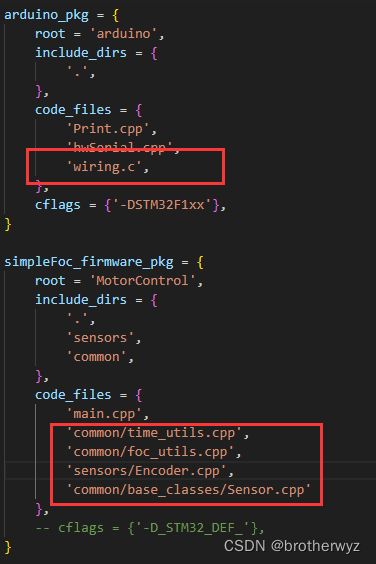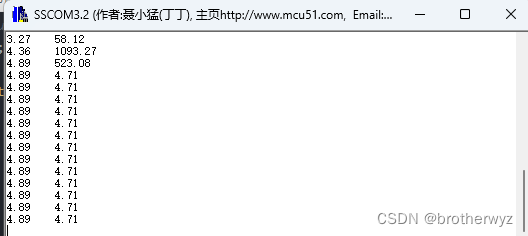- STM32中的计时与延时
lupinjia
STM32stm32单片机
前言在裸机开发中,延时作为一种规定循环周期的方式经常被使用,其中尤以HAL库官方提供的HAL_Delay为甚。刚入门的小白可能会觉得既然有官方提供的延时函数,而且精度也还挺好,为什么不用呢?实际上HAL_Delay中有不少坑,而这些也只是HAL库中无数坑的其中一些。想从坑里跳出来还是得加强外设原理的学习和理解,切不可只依赖HAL库。除了延时之外,我们在开发中有时也会想要确定某段程序的耗时,这就需要
- BART&BERT
Ambition_LAO
深度学习
BART和BERT都是基于Transformer架构的预训练语言模型。模型架构:BERT(BidirectionalEncoderRepresentationsfromTransformers)主要是一个编码器(Encoder)模型,它使用了Transformer的编码器部分来处理输入的文本,并生成文本的表示。BERT特别擅长理解语言的上下文,因为它在预训练阶段使用了掩码语言模型(MLM)任务,即
- 基于STM32与Qt的自动平衡机器人:从控制到人机交互的的详细设计流程
极客小张
stm32qt机器人物联网人机交互毕业设计c语言
一、项目概述目标和用途本项目旨在开发一款基于STM32控制的自动平衡机器人,结合步进电机和陀螺仪传感器,实现对平衡机器人的精确控制。该机器人可以用于教育、科研、娱乐等多个领域,帮助用户了解自动控制、机器人运动学等相关知识。技术栈关键词STM32单片机步进电机陀螺仪传感器AD采集电路Qt人机界面实时数据监控二、系统架构系统架构设计本项目的系统架构设计包括以下主要组件:控制单元:STM32单片机传感器
- 基于STM32的汽车仪表显示系统:集成CAN、UART与I2C总线设计流程
极客小张
stm32汽车嵌入式硬件物联网单片机c语言
一、项目概述项目目标与用途本项目旨在设计和实现一个基于STM32微控制器的汽车仪表显示系统。该系统能够实时显示汽车的速度、转速、油量等关键信息,并通过CAN总线与其他汽车控制单元进行通信。这种仪表显示系统不仅提高了驾驶的安全性和便捷性,还能为汽车提供更智能的用户体验。技术栈关键词微控制器:STM32显示技术:TFTLCD/OLED传感器:速度传感器、温度传感器、油量传感器通信协议:CAN总线、UA
- 基于STM32的简易RTOS分析-预备知识
騏威
嵌入式
写下这篇文章的主要目的是对自己学习RTOS的历程做一个记录和总结,方便以后回忆翻看。以下内容主要来自宋岩先生翻译的《Cortex-M3权威指南》。目录一、Cortex-M3寄存器简介二、堆栈操作简介三、汇编指令简介LDR和STR指令STMDB和LDMIA指令B、BX、BL、BLX指令MRS和MSR指令四、中断简介中断响应过程简介SVC和PensSV中断简介软件中断五、汇编基础一、Cortex-M3
- 15-自编写rtos-结合stm32实际调试(ladylolo-os)
Ladylolo-lsm
stm32嵌入式硬件单片机
一、任务调度:1.理解:任务切换,用堆栈指针SP保存即将要切换的任务的前后文,然后是用PendSV来执行这些操作的;由于是基于优先级的调度策略,所以每次“心跳”都会看有没有优先级更高的出现,如果有就用PendSV进行上下文切换。2.编写部分:①每个任务自己的属性统称为TCB任务控制块。②任务就绪表有设置优先级(设置的时候变量或上优先级的变量让某个位数等于1),从任务就绪表中删除(删除时用与来得等于
- 2. 变量和指令(omron 机器自动化控制器)——2
一半不眠次日si记
OMRONNJ/NX系列PLC指令基准手册自动化运维
机器自动化控制器——第二章变量和指令22-2指令一览通用指令轴指令轴组指令2-3PDO映射必需对象▶伺服轴▶编码器轴不同指令的设定对象▶伺服轴▶编码器轴2-2指令一览运动控制指令分为以下3种。种类概要通用指令MC功能模块通用指令轴指令MC功能模块执行单轴控制的指令轴组指令MC功能模块执行多轴协调控制的指令通用指令的详情参阅“第5章通用指令”,轴指令的详情参阅“第3章轴指令”,轴组的详情参阅“第4章
- 小米嵌入式面试题目RTOS面试题目 嵌入式面试题目
好家伙VCC
面试杂谈杂谈面试职场和发展
第一章-非RTOSbootloader工作流程MCU启动流程通信协议,SPIIICMCU怎么选型,STM32F1和F4有什么区别外部RAM和内部RAM区别,怎么分配外部总线和内部总线区别MCU上的固件,数据是怎么分配的MCU启动流程IAP是怎么升级的,突然断电怎么办挑了麦轮项目(因为大疆RM也是麦轮,面试官看样子比较感兴趣)为什么用的CAN总线你说一下spi和i2c和UART的各自的工作方式优缺点
- 基于STM32F103C8T6定时器的PWM通道的重映射
—你的鼬先生
stm32嵌入式硬件单片机
在我们平时的的使用中,我们最常使用的是TIM2和TIM3的PWM通道,但是由于C8T6的IO口有限,所以可能会出现PWM通道的资源不够的情况,从而我们可能会使用PWM4的PWM通道,但是TIM4的PWM通道并不能直接使用,它需要进行一个重映射,不然可能会导致PWM波不能正常发送。以下就是对PWM4的PWM通道进行一个重映射#include"stm32f10x.h"//Deviceheadervoi
- 【STM32系统】基于STM32设计的锂电池电量/电压检测报警器系统——文末完整资料下载(程序源码/电路原理图/电路PCB/设计文档/模块资料/元器件清单/实物图/答辩问题技巧/PPT模版等)
阿齐Archie
单片机嵌入式项目stm32嵌入式硬件单片机
基于STM32设计的锂电池电量/电压检测报警器系统系统视频:摘要:本设计旨在研究一个基于STM32F103C8T6微控制器的锂电池电量/电压检测报警器系统,应用于便携式电子设备电池管理。系统通过STM32的ADC模块对锂电池电压进行采集,利用LCD1602显示模块实时显示电池电压,当检测到电池电量不足或电压异常时,蜂鸣器报警模块会发出警报提醒用户。系统采用简单的硬件结构和优化的软件架构,通过对实际
- 使用STM32实现简单的智能温控系统
棂梓知识
stm32单片机嵌入式硬件
智能温控系统是一种能够根据环境温度实时调整设备的工作状态的系统。在本篇文章中,我们将使用STM32微控制器来实现一个简单的智能温控系统。该系统将会有以下功能:实时监测环境温度,并显示在LCD屏幕上。当环境温度超过设定的阈值时,自动开启风扇。当环境温度恢复正常时,自动关闭风扇。通过按键模拟调节设定的阈值。系统设计首先,我们需要准备一些硬件设备。具体而言,我们需要以下组件:STM32F103C8T6开
- STM32 HAL freertos零基础(九)任务通知
啥也不会的小白研究生
零基础学习Freertosstm32嵌入式硬件单片机
1、任务通知任务通知用于任务之间同步和通信。任务通知允许一个任务向另一个任务发送一个32位的值,并可以选择是否唤醒正在等待通知的任务。这使得任务之间的同步更加简单和灵活。任务通知功能:发送通知:一个任务可以向另一个任务发送一个32位的值。接收通知:接收任务可以根据接收到的通知来决定何时执行某些操作。通知状态:可以检查任务的当前通知状态。2、相关APIxTaskNotify()//发送通知,带有通知
- 4×4矩阵键盘详解(STM32)
辰哥单片机设计
STM32传感器教学矩阵计算机外设stm32嵌入式硬件单片机传感器
目录一、介绍二、传感器原理1.原理图2.工作原理介绍三、程序设计main.c文件button4_4.h文件button4_4.c文件四、实验效果五、资料获取项目分享一、介绍矩阵键盘,又称为行列式键盘,是用4条I/O线作为行线,4条I/O线作为列线组成的键盘。在行线和列线的每一个交叉点上设置一个按键,因此键盘中按键的个数是4×4个。这种行列式键盘结构能够有效地提高单片机系统中I/O口的利用率,节约单
- STM32的寄存器深度解析
千千道
STM32stm32单片机物联网
目录一、STM32寄存器概述二、寄存器的定义与作用三、寄存器分类1.内核寄存器2.外设寄存器四、重要寄存器详解1.GPIO相关寄存器2.定时器相关寄存器3.中断相关寄存器4.RCC相关寄存器五、寄存器操作方法1.直接操作寄存器2.使用库函数操作寄存器六、总结在嵌入式系统开发中,STM32微控制器以其强大的性能和丰富的功能而备受青睐。而理解和掌握STM32的寄存器是深入学习和开发STM32的关键。本
- STM32 如何生成随机数
千千道
STM32stm32单片机物联网
目录一、引言二、STM32随机数发生器概述三、工作原理1.噪声源2.线性反馈移位寄存器(LFSR)3.数据寄存器(RNG_DR)4.监控和检测电路:5.控制和状态寄存器6.生成流程四、使用方法1.使能随机数发生器2.读取随机数3.错误处理五、注意事项1.随机数的质量2.安全性3.性能考虑六、总结一、引言在嵌入式系统开发中,随机数的生成常常是一个重要的需求。无论是用于加密、模拟、游戏还是其他需要不确
- STM32——看门狗通俗解析
百里与司空
stm32嵌入式硬件单片机门控循环单元
笔者在学习看门狗的视频后,对看门狗仍然是一知半解,后面在实际应用中发现它是一个很好用的检测或者调试工具。所以总结一下笔者作为初学小白对看门狗的理解。主函数初始化阶段、循环阶段和复位众所周知,程序的运行一般是这样的:程序在进入循环阶段之前,会在初始化阶段将每个寄存器或者某些变量赋值。初始化阶段的代码执行一次后,就不再执行了。而循环阶段的代码会执行很多次,一直循环反复的执行下去。这时,如果进行了复位,
- STM32 的 RTC(实时时钟)详解
千千道
STM32stm32物联网单片机
目录一、引言二、RTC概述三、RTC的工作原理1.时钟源2.计数器3.闹钟功能4.备份寄存器四、RTC寄存器1.RTC_TR(TimeRegister,时间寄存器)2.RTC_DR(DateRegister,日期寄存器)3.RTC_SSR(SubsecondRegister,亚秒寄存器)4.RTC_PRER(PrescalerRegister,预分频器寄存器)5.RTC_CR(ControlReg
- 2020-11-12 写单片机内存的脚本 nc openocd 事务自动测试
linuxScripter
这是写单片机内存的脚本:z@z-ThinkPad-T400:~/zworkT400/EDA_heiche/zREPOgit/simple-gcc-stm32-project$catz.wholeRun.oneCase.cmdcattmp6.toWrite|awk'{system("echomwb"$1""$2"|nclocalhost4444");}'catUSER/DEBUG/debug.h|g
- transformer架构(Transformer Architecture)原理与代码实战案例讲解
AI架构设计之禅
大数据AI人工智能Python入门实战计算科学神经计算深度学习神经网络大数据人工智能大型语言模型AIAGILLMJavaPython架构设计AgentRPA
transformer架构(TransformerArchitecture)原理与代码实战案例讲解关键词:Transformer,自注意力机制,编码器-解码器,预训练,微调,NLP,机器翻译作者:禅与计算机程序设计艺术/ZenandtheArtofComputerProgramming1.背景介绍1.1问题的由来自然语言处理(NLP)领域的发展经历了从规则驱动到统计驱动再到深度学习驱动的三个阶段。
- arm-none-eabi-gcc 不识别__attribute__((at(xxx))命令如何将数据定义到外部SDAM(已验证)
梓默
#C
提示:文章写完后,目录可以自动生成,如何生成可参考右边的帮助文档文章目录可以利用__attribute__((section(".xxx")))实现同样的效果步骤:1.在linker链接文件中添加指定SDRAM加偏移地址2.添加SDRAM自定义section3.将数据定义到自定义区可以利用__attribute__((section(".xxx")))实现同样的效果步骤:从STM32H7xx参考手
- C语言《智能自平衡小车,实现平衡功能的基础上,加入了超声波避障、超声波跟随、蓝牙遥控等功能》+源代码+文档说明
jzpfbpx
c语言开发语言
文章目录源代码下载地址项目介绍项目功能项目备注源代码下载地址源代码下载地址点击这里下载源码项目介绍C语言《智能自平衡小车,实现平衡功能的基础上,加入了超声波避障、超声波跟随、蓝牙遥控等功能》+源代码+文档说明项目功能为了实现小车功能,小车硬件主要包括:控制核心板带编码器的直流电机车架12V1900mah锂电池项目备注1、该资源内项目代码都经过测试运行成功,功能ok的情况下才上传的,请放心下载使用!
- 如何实现视频数据的PES打包和传输?
音视频牛哥
软件开发音视频ps打包数据psrtppsH.264gb28181ps大牛直播SDK
实现视频的PES(PacketizedElementaryStream)打包和传输涉及多个步骤,主要包括视频数据的编码、PES打包、以及通过网络协议的传输。以下是大概的实现思路:一、视频数据编码原始视频数据获取:获取需要传输的原始视频数据,这些数据可能来自摄像头、文件或其他视频源。视频编码:使用视频编码器(如H.264、H.265等)对原始视频数据进行编码,生成编码后的视频码流(ES,Elemen
- Error: No STM32 target found! If your product embeds Debug Authentication, please perform a discover
BABA8891
stm32嵌入式硬件单片机
这个错误信息“Error:NoSTM32targetfound!IfyourproductembedsDebugAuthentication,pleaseperformadiscoveryusingDebugAuthentication”通常出现在使用STM32微控制器的开发过程中,尤其是在尝试通过调试接口(如SWD或JTAG)与设备通信时。这个错误表明调试器或开发工具无法识别或连接到STM32目
- 阀门定位器
ZHD18060503853
单片机嵌入式硬件
阀门定位器:(福克斯波罗,YTC,山武)PLC:(西门子,施耐德,ABB,AB,三菱,欧姆龙)泵阀:(威格士,哈威,伊顿,阿托斯)传感器:(倍加福,西克,伦茨,巴鲁夫,易福门,图尔克,安川)编码器:(海德汉,堡盟,亨士乐)西门子:罗宾康,6AG1模块,6FC5851数控软件,3UF电机保护器,数控卡件,烟气分析仪霍尼韦尔:微动开关,测厚仪配件,麦克森燃烧ABB:DCS,张力控制器,压力计,机器人配
- A20B-8002-0020发那科
ZHD18060503853
自动化
阀门定位器:(福克斯波罗,YTC,山武)PLC:(西门子,施耐德,ABB,AB,三菱,欧姆龙)泵阀:(威格士,哈威,伊顿,阿托斯)传感器:(倍加福,西克,伦茨,巴鲁夫,易福门,图尔克,安川)编码器:(海德汉,堡盟,亨士乐)西门子:罗宾康,6AG1模块,6FC5851数控软件,3UF电机保护器,数控卡件,烟气分析仪霍尼韦尔:微动开关,测厚仪配件,麦克森燃烧ABB:DCS,张力控制器,压力计,机器人配
- 解码工业自动化:ArtInChip M6800系列编码器接口协议全解析
芯智云
自动化网络运维
在工业自动化的浪潮中,编码器以其精确的位置和速度反馈是实现精密控制的基础。随着技术的发展,编码器与控制系统之间的通信协议变得尤为关键。本文将聚焦于多摩川、BISS和Endat等主流协议,以ArtInChipM6800系列芯片为例,分析它们如何满足不同工业场景的需求,以及如何推动自动化技术的进步。01-多摩川协议多摩川协议是基于485硬件接口的标准NRZ协议,其通讯波特率常见2.5MHz和5MHz,
- STM32与ESP8266的使用
每天的积累
嵌入式学习日记stm32stm32单片机嵌入式硬件
串口透传“透传”通常指的是数据的透明传输,意思是在不对数据进行任何处理或修改的情况下,将数据从一个接口转发到另一个接口。值得注意的是要避免串口之间无限制的透明,可以采用互斥锁的方式进行限制使用方法对USART1和USART3(用他俩举例)的模式都是设置为Asynchronous,并开启对应的中断。RCC的HighSPeedCLock模式设置为Crystal/Ceramic配置对应的时钟为64Mhz
- ARM-Cortex-M架构:1、STM32函数参数传递
天城寺电子
嵌入式软件开发arm开发stm32汇编C语言
文章目录参数传递概览堆栈传递参数具体过程参数传递概览在调用子函数时,ARMCortex-M3处理器可以使用寄存器和堆栈来传递参数。具体使用哪种方式取决于传递的参数数量和调用约定(callingconvention)。参数传递方式ARMCortex-M3处理器使用ARMEABI(EmbeddedApplicationBinaryInterface)标准来定义参数传递的约定。根据这个约定:1、寄存器传
- 物流系统中的嵌入式:STM32微控制器与智能算法驱动的物理循迹小车详细流程
极客小张
stm32嵌入式硬件单片机机器人算法物联网c语言
一、项目概述本项目旨在开发一款基于STM32微控制器的物理循迹小车,具备二维码识别能力,并能够将物品送到指定的物流位置。通过传感器和算法的结合,小车将实现自主导航和路径规划,从而提高物流效率和准确性。项目的目标是为智能物流提供一种新颖的解决方案,适用于仓库、工厂等场景。技术栈关键词硬件平台:STM32微控制器(如STM32F4系列)传感器:红外循迹传感器、摄像头模块、超声波传感器驱动模块:电机驱动
- 大疆开发型c板BMI088-IMU零漂问题优化解决(1)
一流L
单片机stm32嵌入式硬件
在基于clion开发大疆开发型c板STM32F407IG过程中出现的零点漂移严重情况的解决1.首先我们先了解一下IMU零漂校准IMU数据的目的是消除传感器本身固有的偏差和不确定性,使得测量数据更加准确和可靠。在这个函数中,校准过程主要是通过乘以比例因子和加上偏移量来实现的,具体步骤如下:首先需要进行传感器的零偏校准(offsetcalibration)。这一步骤的目的是测量出传感器在静止状态下的输
- springmvc 下 freemarker页面枚举的遍历输出
杨白白
enumfreemarker
spring mvc freemarker 中遍历枚举
1枚举类型有一个本地方法叫values(),这个方法可以直接返回枚举数组。所以可以利用这个遍历。
enum
public enum BooleanEnum {
TRUE(Boolean.TRUE, "是"), FALSE(Boolean.FALSE, "否");
- 实习简要总结
byalias
工作
来白虹不知不觉中已经一个多月了,因为项目还在需求分析及项目架构阶段,自己在这段
时间都是在学习相关技术知识,现在对这段时间的工作及学习情况做一个总结:
(1)工作技能方面
大体分为两个阶段,Java Web 基础阶段和Java EE阶段
1)Java Web阶段
在这个阶段,自己主要着重学习了 JSP, Servlet, JDBC, MySQL,这些知识的核心点都过
了一遍,也
- Quartz——DateIntervalTrigger触发器
eksliang
quartz
转载请出自出处:http://eksliang.iteye.com/blog/2208559 一.概述
simpleTrigger 内部实现机制是通过计算间隔时间来计算下次的执行时间,这就导致他有不适合调度的定时任务。例如我们想每天的 1:00AM 执行任务,如果使用 SimpleTrigger,间隔时间就是一天。注意这里就会有一个问题,即当有 misfired 的任务并且恢复执行时,该执行时间
- Unix快捷键
18289753290
unixUnix;快捷键;
复制,删除,粘贴:
dd:删除光标所在的行 &nbs
- 获取Android设备屏幕的相关参数
酷的飞上天空
android
包含屏幕的分辨率 以及 屏幕宽度的最大dp 高度最大dp
TextView text = (TextView)findViewById(R.id.text);
DisplayMetrics dm = new DisplayMetrics();
text.append("getResources().ge
- 要做物联网?先保护好你的数据
蓝儿唯美
数据
根据Beecham Research的说法,那些在行业中希望利用物联网的关键领域需要提供更好的安全性。
在Beecham的物联网安全威胁图谱上,展示了那些可能产生内外部攻击并且需要通过快速发展的物联网行业加以解决的关键领域。
Beecham Research的技术主管Jon Howes说:“之所以我们目前还没有看到与物联网相关的严重安全事件,是因为目前还没有在大型客户和企业应用中进行部署,也就
- Java取模(求余)运算
随便小屋
java
整数之间的取模求余运算很好求,但几乎没有遇到过对负数进行取模求余,直接看下面代码:
/**
*
* @author Logic
*
*/
public class Test {
public static void main(String[] args) {
// TODO A
- SQL注入介绍
aijuans
sql注入
二、SQL注入范例
这里我们根据用户登录页面
<form action="" > 用户名:<input type="text" name="username"><br/> 密 码:<input type="password" name="passwor
- 优雅代码风格
aoyouzi
代码
总结了几点关于优雅代码风格的描述:
代码简单:不隐藏设计者的意图,抽象干净利落,控制语句直截了当。
接口清晰:类型接口表现力直白,字面表达含义,API 相互呼应以增强可测试性。
依赖项少:依赖关系越少越好,依赖少证明内聚程度高,低耦合利于自动测试,便于重构。
没有重复:重复代码意味着某些概念或想法没有在代码中良好的体现,及时重构消除重复。
战术分层:代码分层清晰,隔离明确,
- 布尔数组
百合不是茶
java布尔数组
androi中提到了布尔数组;
布尔数组默认的是false, 并且只会打印false或者是true
布尔数组的例子; 根据字符数组创建布尔数组
char[] c = {'p','u','b','l','i','c'};
//根据字符数组的长度创建布尔数组的个数
boolean[] b = new bool
- web.xml之welcome-file-list、error-page
bijian1013
javaweb.xmlservleterror-page
welcome-file-list
1.定义:
<welcome-file-list>
<welcome-file>login.jsp</welcome>
</welcome-file-list>
2.作用:用来指定WEB应用首页名称。
error-page1.定义:
<error-page&g
- richfaces 4 fileUpload组件删除上传的文件
sunjing
clearRichfaces 4fileupload
页面代码
<h:form id="fileForm"> <rich:
- 技术文章备忘
bit1129
技术文章
Zookeeper
http://wenku.baidu.com/view/bab171ffaef8941ea76e05b8.html
http://wenku.baidu.com/link?url=8thAIwFTnPh2KL2b0p1V7XSgmF9ZEFgw4V_MkIpA9j8BX2rDQMPgK5l3wcs9oBTxeekOnm5P3BK8c6K2DWynq9nfUCkRlTt9uV
- org.hibernate.hql.ast.QuerySyntaxException: unexpected token: on near line 1解决方案
白糖_
Hibernate
文章摘自:http://blog.csdn.net/yangwawa19870921/article/details/7553181
在编写HQL时,可能会出现这种代码:
select a.name,b.age from TableA a left join TableB b on a.id=b.id
如果这是HQL,那么这段代码就是错误的,因为HQL不支持
- sqlserver按照字段内容进行排序
bozch
按照内容排序
在做项目的时候,遇到了这样的一个需求:
从数据库中取出的数据集,首先要将某个数据或者多个数据按照地段内容放到前面显示,例如:从学生表中取出姓李的放到数据集的前面;
select * fro
- 编程珠玑-第一章-位图排序
bylijinnan
java编程珠玑
import java.io.BufferedWriter;
import java.io.File;
import java.io.FileWriter;
import java.io.IOException;
import java.io.Writer;
import java.util.Random;
public class BitMapSearch {
- Java关于==和equals
chenbowen00
java
关于==和equals概念其实很简单,一个是比较内存地址是否相同,一个比较的是值内容是否相同。虽然理解上不难,但是有时存在一些理解误区,如下情况:
1、
String a = "aaa";
a=="aaa";
==> true
2、
new String("aaa")==new String("aaa
- [IT与资本]软件行业需对外界投资热情保持警惕
comsci
it
我还是那个看法,软件行业需要增强内生动力,尽量依靠自有资金和营业收入来进行经营,避免在资本市场上经受各种不同类型的风险,为企业自主研发核心技术和产品提供稳定,温和的外部环境...
如果我们在自己尚未掌握核心技术之前,企图依靠上市来筹集资金,然后使劲往某个领域砸钱,然
- oracle 数据块结构
daizj
oracle块数据块块结构行目录
oracle 数据块是数据库存储的最小单位,一般为操作系统块的N倍。其结构为:
块头--〉空行--〉数据,其实际为纵行结构。
块的标准大小由初始化参数DB_BLOCK_SIZE指定。具有标准大小的块称为标准块(Standard Block)。块的大小和标准块的大小不同的块叫非标准块(Nonstandard Block)。同一数据库中,Oracle9i及以上版本支持同一数据库中同时使用标
- github上一些觉得对自己工作有用的项目收集
dengkane
github
github上一些觉得对自己工作有用的项目收集
技能类
markdown语法中文说明
回到顶部
全文检索
elasticsearch
bigdesk elasticsearch管理插件
回到顶部
nosql
mapdb 支持亿级别map, list, 支持事务. 可考虑做为缓存使用
C
- 初二上学期难记单词二
dcj3sjt126com
englishword
dangerous 危险的
panda 熊猫
lion 狮子
elephant 象
monkey 猴子
tiger 老虎
deer 鹿
snake 蛇
rabbit 兔子
duck 鸭
horse 马
forest 森林
fall 跌倒;落下
climb 爬;攀登
finish 完成;结束
cinema 电影院;电影
seafood 海鲜;海产食品
bank 银行
- 8、mysql外键(FOREIGN KEY)的简单使用
dcj3sjt126com
mysql
一、基本概念
1、MySQL中“键”和“索引”的定义相同,所以外键和主键一样也是索引的一种。不同的是MySQL会自动为所有表的主键进行索引,但是外键字段必须由用户进行明确的索引。用于外键关系的字段必须在所有的参照表中进行明确地索引,InnoDB不能自动地创建索引。
2、外键可以是一对一的,一个表的记录只能与另一个表的一条记录连接,或者是一对多的,一个表的记录与另一个表的多条记录连接。
3、如
- java循环标签 Foreach
shuizhaosi888
标签java循环foreach
1. 简单的for循环
public static void main(String[] args) {
for (int i = 1, y = i + 10; i < 5 && y < 12; i++, y = i * 2) {
System.err.println("i=" + i + " y="
- Spring Security(05)——异常信息本地化
234390216
exceptionSpring Security异常信息本地化
异常信息本地化
Spring Security支持将展现给终端用户看的异常信息本地化,这些信息包括认证失败、访问被拒绝等。而对于展现给开发者看的异常信息和日志信息(如配置错误)则是不能够进行本地化的,它们是以英文硬编码在Spring Security的代码中的。在Spring-Security-core-x
- DUBBO架构服务端告警Failed to send message Response
javamingtingzhao
架构DUBBO
废话不多说,警告日志如下,不知道有哪位遇到过,此异常在服务端抛出(服务器启动第一次运行会有这个警告),后续运行没问题,找了好久真心不知道哪里错了。
WARN 2015-07-18 22:31:15,272 com.alibaba.dubbo.remoting.transport.dispatcher.ChannelEventRunnable.run(84)
- JS中Date对象中几个用法
leeqq
JavaScriptDate最后一天
近来工作中遇到这样的两个需求
1. 给个Date对象,找出该时间所在月的第一天和最后一天
2. 给个Date对象,找出该时间所在周的第一天和最后一天
需求1中的找月第一天很简单,我记得api中有setDate方法可以使用
使用setDate方法前,先看看getDate
var date = new Date();
console.log(date);
// Sat J
- MFC中使用ado技术操作数据库
你不认识的休道人
sqlmfc
1.在stdafx.h中导入ado动态链接库
#import"C:\Program Files\Common Files\System\ado\msado15.dll" no_namespace rename("EOF","end")2.在CTestApp文件的InitInstance()函数中domodal之前写::CoIniti
- Android Studio加速
rensanning
android studio
Android Studio慢、吃内存!启动时后会立即通过Gradle来sync & build工程。
(1)设置Android Studio
a) 禁用插件
File -> Settings... Plugins 去掉一些没有用的插件。
比如:Git Integration、GitHub、Google Cloud Testing、Google Cloud
- 各数据库的批量Update操作
tomcat_oracle
javaoraclesqlmysqlsqlite
MyBatis的update元素的用法与insert元素基本相同,因此本篇不打算重复了。本篇仅记录批量update操作的
sql语句,懂得SQL语句,那么MyBatis部分的操作就简单了。 注意:下列批量更新语句都是作为一个事务整体执行,要不全部成功,要不全部回滚。
MSSQL的SQL语句
WITH R AS(
SELECT 'John' as name, 18 as
- html禁止清除input文本输入缓存
xp9802
input
多数浏览器默认会缓存input的值,只有使用ctl+F5强制刷新的才可以清除缓存记录。如果不想让浏览器缓存input的值,有2种方法:
方法一: 在不想使用缓存的input中添加 autocomplete="off"; eg: <input type="text" autocomplete="off" name

